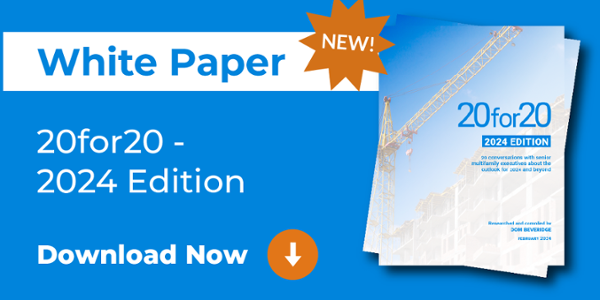
A few weeks ago, I wrote about the experience of participating in a Colorado state congressional hearing on a proposed law to outlaw revenue management. One of several points in that article was about the potential gap in our industry's advocacy that appears when state legislatures create national problems.
A few weeks ago, the American Economic Liberties Project (AELP), an activist organization, issued a disturbing new memo aimed at nationalizing legislative initiatives against multifamily revenue management. The memo demonstrates the challenge we are likely to face in this election year and the potential blind spot it exposes in our advocacy framework.
A background on advocacy
Our industry's two main advocacy organizations, NMHC and NAA, both do yeoman's work on behalf of our industry. At the federal level, NMHC is an effective, well-staffed organization advocating for our interests. NAA coordinates the activities of its many member organizations (typically state and more local apartment associations) to provide equivalent advocacy at the local level.
That is an important distinction. While both organizations sometimes join ad hoc advocacy initiatives and work to coordinate messaging, the core focus of NMHC's activities is federal, while NAA's is primarily local. That covers the industry's legislative bases, but as the AELP memo demonstrates, sometimes local affairs get nationalized. And that can be a problem for the many owners and operators conducting business across multiple states or nationwide.
When local legislation goes national
The AELP memo, titled: "A New Culprit in the Housing Crisis: Rent-Setting Software Algorithms," is designed to speed up the process of outlawing current revenue management applications. The memo restates most of the now-familiar (bogus) arguments for banning some familiar revenue management software. Only it goes much further, offering a template for legislation for state lawmakers interested in organizing their own bans on revenue management software.
Not surprisingly, the language echoes the Colorado bill. We are in an election year, and there is now plenty of evidence to suggest that lawmakers, particularly in blue states, may see this kind of legislation as a vote-winner. Organizations like AELP can pour gasoline on this fire, shortening the process for introducing new and potentially harmful bills. The industry needs to aware of what is happening so that companies can decide what to do.
When state legislation arises, it is appropriate to handle it at the state level. Local trade associations typically have the best understanding of local issues and have the strongest relationships with key legislative and executive players. In the case of the Colorado RM legislation, it fell to the local NAA affiliates, the Colorado Apartment Association and Apartment Association of Metro Denver, to represent our interests. I was joined by Drew Hamrick, General Counsel and SVP of Government Affairs of the aforementioned NAA affiliates, in providing testimony at the committee hearing.
The fear is that, in the face of a coordinated national program like AELP's, the federated approach that works well when issues are truly local now looks like a piecemeal response. Well-funded national threats demand well-funded national responses. Multifamily organizations that operate nationally need to take a national perspective as this matter develops.
What to do
This AELP memo ought to draw a proactive, nationwide response from our industry. NAA affiliates are central to handling individual legislative initiatives. But it may be time for our agencies to create a robust national response to what is effectively a national agenda masquerading as local politics.
Revenue management has been a hot topic for the wrong reasons over the last 18 months. The nature of the class action lawsuits makes it appropriate for operators to remain silent until the litigation is resolved. The legislative initiatives, however, are an altogether different matter. Their intent is to outlaw an activity that is valuable to our industry. Owners and operators should be aware of what is happening and understand what they can do to influence the situation.
In every legislature considering a bill like CO HB24-1057, there are moderate lawmakers to be persuaded and votes to be won. Restricting revenue management is ultimately harmful to housing affordability—our industry should be making that case in response to the tide of bad bills appearing in local legislatures.
National multifamily platforms should grasp the opportunity to support local associations. For that to happen and for multifamily to punch its weight, we need to raise the level of awareness of coordinated national campaigns and find creative and collaborative ways for more companies to influence the response. It's time to think outside of the box about advocacy.
Photo by Suad Kamardeen on Unsplash



